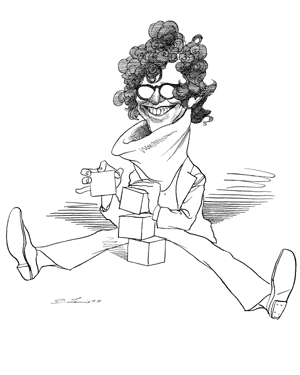In his poem “Some General Instructions,” which The New York Review published in 1975, Kenneth Koch offered advice on how to live. “Be careful not to set fire/To a friend’s house.” “When taking pills, be sure/You know what they are.” “To ‘cure’ a dead octopus/You hold it by one leg and bang it against a rock.” But quoting bits of the poem seems a falsification, because its true effects are cumulative—it is 233 lines long, a punch-drunk sort of length, as if its principal message were that one should never, in this life, worry about going over quota—and much of its alternating lyricism and irony depend on the coloring that each line receives from its placement above or below another. Koch stuck to ordinary language—the dangerously trite language of self-help manuals—and somehow walked the knife’s edge between wicked parody and an honest urgency that acknowledged the reader’s need to know how to exist in the world. “Think of what you feel/Secretly, and how music has imitated that. Make a moue.” Besides which, he was not afraid of humor—not just as an ornament, but as the engine driving serious self-examination, which is another way of saying that this extravagantly long poem is an enactment of stylistic humility. It never claims to know more than just what is contained in each line—for example, how to cure an octopus.
“Some General Instructions” was one of a number of discoveries I made while going through the five-hundred-odd poems that the Review has published over the last forty-eight years. To choose the thirty poems that we’re now posting daily for National Poetry Month, I decided to haul my net in a chronological direction: I started in February 1963 and read the poems from one year to the next. What struck me was how much history is embedded here: not only Zbigniew Herbert and Czesław Miłosz and Anna Akhmatova often speaking from their experience of the Eastern Bloc, but history in the form of shifting tones of voice (Koch again, but also John Berryman and Anne Carson and Frederick Seidel), and perhaps surprising precedents, like James Merrill on the terror spread by suicide bombers, which he found a way to write about in 1984.
It’s been argued that poetry is an ailing art—indeed, National Poetry Month itself often seems to me a defibrillator desperately applied to the limp body of lyric poetry, while the world’s novels and memoirs and tweets and video games mill around, loud, vertical, and indifferent—but reading the last five decades of poems in the Review is a pretty good antidote to such anxieties. The intellectual energy of poetic language doesn’t seem a limited resource; poets will continue to find new ways to say the necessary things. And anyway, as Koch advises, “Do not/Be in too much of a hurry to emulate what/You admire.”



